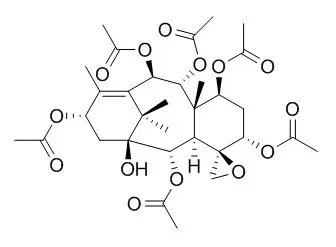| In vivo: |
| J Nat Med. 2013 Jul;67(3):512-8. | | Development of an indirect competitive enzyme-linked immunosorbent assay (icELISA) using highly specific monoclonal antibody against paclitaxel.[Pubmed: 23007175] | Paclitaxel, the major active component of the yew tree, is used as an important anti-cancer agent.
METHODS AND RESULTS:
To obtain the monoclonal antibody (MAb) against paclitaxel for paclitaxel determination using immunoassay, 7-xylosyltaxol was conjugated to the carrier protein bovine serum albumin (BSA) to construct the immunogen, and the ratio of hapten in XylTax-BSA conjugate was determined by matrix-assisted laser desorption/ionization time-of-flight mass spectrometry. After immunization of mice with this conjugate, hybridomas secreting MAbs against paclitaxel were obtained by fusing the splenocytes with the mouse myeloma cell line SP2/0. After hybridoma screening, the anti-paclitaxel MAb 3A3 was obtained, which showed a relatively high specificity to paclitaxel (cross-reactivities against other naturally occurred taxanes: 7-xylosyltaxol, 31.8%; cephalomannine, 6.17%; baccatin III, 10-deacetyl-baccatin III, 1-Hydroxybaccatin I, 13-acetyl-9-dihydrobaccatin III and 1-acetoxyl-5-deacetyl-baccatin I, <0.11%). Using the MAb 3A3, we established an indirect competitive enzyme-linked immunosorbent assay (icELISA) for paclitaxel determination with a detection range of 0.098-312.5 μg ml(-1). Determination of paclitaxel contents in various yew tree samples with this icELISA resulted in recovery rates ranging from 92 to 94.8%, and intra- and inter-assay variations of 3.6 and 4.7%, respectively.
CONCLUSIONS:
This icELISA provides a valuable method of paclitaxel determination for various purposes. | | J Ethnopharmacol. 2003 Dec;89(2-3):265-70. | | Anti-inflammatory and antinociceptive activity of taxoids and lignans from the heartwood of Taxus baccata L.[Pubmed: 14611890] |
METHODS AND RESULTS:
Four taxoids (taxusin, baccatin VI, baccatin III and 1beta-hydroxybaccatin I(1-Hydroxybaccatin I)) and five lignans (lariciresinol, taxiresinol, 3'-demethylisolariciresinol-9'-hydroxyisopropylether, isolariciresinol and 3-demethylisolariciresinol) were isolated from the heartwood of Taxus baccata L. (Taxaceae) growing in Turkey through chromatographic techniques. In vivo anti-inflammatory and antinociceptive activity of these compounds were investigated.
CONCLUSIONS:
All the compounds were shown to possess significant antinociceptive activity against p-benzoquinone-induced abdominal contractions, while only lignan derivatives significantly inhibited carrageenan-induced hind paw edema in mice. |
|






 Cell. 2018 Jan 11;172(1-2):249-261.e12. doi: 10.1016/j.cell.2017.12.019.IF=36.216(2019)
Cell. 2018 Jan 11;172(1-2):249-261.e12. doi: 10.1016/j.cell.2017.12.019.IF=36.216(2019) Cell Metab. 2020 Mar 3;31(3):534-548.e5. doi: 10.1016/j.cmet.2020.01.002.IF=22.415(2019)
Cell Metab. 2020 Mar 3;31(3):534-548.e5. doi: 10.1016/j.cmet.2020.01.002.IF=22.415(2019) Mol Cell. 2017 Nov 16;68(4):673-685.e6. doi: 10.1016/j.molcel.2017.10.022.IF=14.548(2019)
Mol Cell. 2017 Nov 16;68(4):673-685.e6. doi: 10.1016/j.molcel.2017.10.022.IF=14.548(2019)